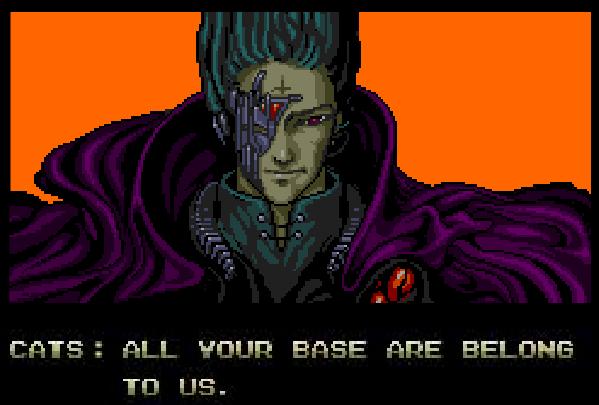You know roughly where your body is at all times, but where in it is your “self”?
Your center of mass is around the solar plexus, yet that doesn’t seem to universally be where people feel the center of their self to be. Most people feel they “are” right behind their eyes, probably in the brain.
Sometimes people have out-of-body experiences, completely changing their anchor for a while.
When pointing at themselves, people tend to point a thumb at their chest or face. Do they feel differently about it, or is it just convenience?
Are you a body with a head full of thinking goop and sensors on top, or are you a head sitting on a body?
And wherever you feel you are, have you felt different at any time? Can you change it?
Personally, I can’t separate the feeling of self from my vision, so “I” am directly behind my eyeballs and I can’t change it.
I’m a mind hosted by a brain piloting a bone mecha covered in flesh armor
You win.
Calcium is a metal. So we’re just normal robots
I take the Buddhist view that what we call the self is a misconception or misunderstanding. While you do exist, there isn’t a soul or some permanent entity that takes residence and jumps around before or after death.
Thus, you can ask questions like these and get a million different answers because the question is not valid. It’s what the Buddha would call proliferation, or basically hot air. There isn’t an answer, why ask the question?
Don’t mistake this for a cynical view, though. A good Buddhist is very happy because even though the idea of a self is false, freeing yourself from all of these self-based concepts and desires leads to great peace. The obsession with self and self-based craving is what leads to any kind of unhappiness.
Intersting view! As to why I ask, I am not looking to find the definite correct answer. I want to know what people feel and hoe differently they do so, whether what they feel is real or illusory.
I just have to say I think you just stumped the Buddha. If I’m understanding, then the reason for proliferation is for the wisdom gained from outside perspective. The analysis of 1000 “wrong” answers can give insight as to the nature of reality or the “right” answer.
I feel you on that. As a Buddhist I’m also curious. 😀
You are mostly your brain, which extends to the rest of your body.
The thing about OOB cases is that the human brain is really good at faking information, or just generating it out of thin air.
In fact it never stops doing that, unless it is allowed to completely die.
If a person is resurrected, the brain generates “filler” information for the duration you were “out”.
For some, that is seeing an “afterlife”.
There is no universally specified “afterlife”, it’s based entirely on culture, and what the person has grown to believe in, even if they don’t believe it anymore.
Good Dog
deleted by creator
Username jokes can be low-hanging fruit, but I thought that one was fairly wholesome.
deleted by creator
“If a person is resurrected” then they are Jesus, or proof that there is an after-life, and miracles do happen. On the other hand, people are resuscitated all the time by modern medicine.
Shh now, don’t tell them about necromancy.
Oh man, this reminds me of a really cool PBS Nova mini series on the brain and how it’s basically very flawed at perception and how we ingest the world around us. Extremely fascinating.
That’s valid and objectively sound. The area closest to the most detailed sensory input and processing ability makes sense as the center.
Though if people feel strongly that they are somewhere else, it’d be really intdresting to hear about.
Sitting on the toilet taking a shit. I’d prefer not to.
Ahh shifting your center of mass.
You can do it 💪
May the force be with you
Cheering on the guy who does not avoid shitting for 3 days Keep up the good fight, my dude!
deleted by creator
Accurate. We’re bone mech, wearing flesh armour, driven by gut bacteria in our gut cabins.
Quite literally you are your brain, trying to account for the entire body and mind as the self simultaneously. But you may catch yourself thinking or saying things like “I can’t wrap my brain around this.” Isn’t that odd? Your brain refers to itself as my brain. Is that a linguistic issue or is your sense of perspective off?
“Don’t you have a heart?” Why do we imply that our sense of compassion is only located in an organ that just pumps blood? That clearly can’t be the case.
We know cases where someone gets a brain tumor and suddenly becomes violent or unfeeling. When the brain is damaged either during life or during gestation, we know that we can lose all manner of things: cognition, motor skills, memory, emotions, etc. It’s all the brain.
What confuses the issue is everything the brain is attached to. What I think all conscious humans do is try to make sense of the mind-body connection. I feel tired, that’s not just my brain feeling tired. I can feel tired in every single part of my body independently or all together. “I” am the brain. If I lose an arm, I don’t lose my sense of self. But losing important functions can damage the self I’ve constructed of myself. If I lose my eyesight I will be a very different person when I’m unable to visually enjoy video games, movies, art, nature. But clearly blind people still have a self. If it sits behind their eyes, will it move? Adapt to their ears?
All this to say, your self is self constructed. It’s malleable. But make no mistake that the source of where self and consciousness are maintained is the brain.
This post illustrates well why some Buddhists, among others, regard the self to be an illusion. When called to locate it or bring it forth, we ultimately can’t do so.
deleted by creator
My brain silently groaned “Ugh, I need more coffee to process something like this so early! Body, take me to the coffee.”
I feel this is an answer to the question.
Hub. Interesting. My sense of self tends to be around my shoulder/back of head/neck area. I don’t get the feeling that I’m right behind my eyeballs, my sense of self is A bit lower and further back than that. Like, if I were centered between my ears, I’d have to move a bit lower and a bit more back.
Such a strange thing to have to focus on.
I live in my head. My body is annoying.
I’ve never felt particularly connected to my body.
Have you ever felt someone else connect to your body?
No. It’s just more a feeling like my body is a tool I’m using. It’s not me, and has little to do with me personally any more than a hammer I use is personal.
It would be interesting to know whether the location of your ‘self’ is tied to your dominant sense. So people blind from birth could be ‘between their ears’? Which isn’t that different, but would still produce slightly different answers. And how about people missing both hearing and vision? Could a person be ‘in their hands’? ‘Up their nose’? I’d better stop.
These are questions you should ponder after a nice healthy dose of psilocybin. You can be just about anywhere you want to be and pick what works for you.
After you’ve cleared completely or during the comedown? Can you even control what you think about while on psilocybin? If so, what’s your method? I’ve done it twice and never managed to think about what I wanted to think beforehand.
I have a remarkable connection to reality when I eat mushrooms, it seems. I can just point my brain in a direction and it will go as far as I let it. For me, and I don’t know what to call it, I have an interesting “reality bubble” that I can “stay in” if I desire. It’s a part of my brain that knows that everything I am seeing is not real and where I can make somewhat decent choices if I need. I have a tripping inner dialogue as well as a “normal” internal dialogue that keeps me sane. It’s… Interesting.
If I have a task to do, like drawing something or working in CAD, it will keep my brain somewhat focused albeit with a ton of added flair.
And no, I can’t control all of my thoughts but those still remain somewhat superficial and are not really that intrusive. However, letting my mind go free and letting me think about things from a different perspective is probably the primary reason I trip. My personal mental barriers that I have put up over the years are needing to be torn away so I can become the good person I strive to be and deal with some aspects of my past in a somewhat healthy way. I have no fear of a “bad trip” as I view it as an aspect of my life and personality that needs further exploration.
I should note that I have a very high tolerance and psilocybin is a perfect match for my personality type and brain chemistry. (Weed, for example, gets me super paranoid and is not for me.) I can easily eat 5-10 grams just to get me started and have eaten as much as 20 grams throughout an evening.
Short term memory loss is a thing as well. I can completely forget what it was a wanted to think about, but after a bit, I can usually get focused on something. What usually happens is that my brain figures out the solution to the problem I wanted to think about extremely fast so there is not much to ponder on. :P
Thanks for the insight, I’ll keep in mind for next time. I suppose your grams are fresh, not dry. 5 grams dry is supposed to take you to Jupiter, but then again we’re all different.
I’m also wanting to break down some of the mental barriers I’ve built over the years, for similar reasons, and also don’t fear a bad trip- though I’m not as experienced so finding a low risk moment to trip is the challenge more than anything.
I’ve noticed my regular self (this part of me typing right now) also remains contained and I can tell things aren’t real, but actually commanding myself like I do while clear is very hard. It’s the rest of me taking over, and I’m glad she’s smart enough, but I don’t think AutoCAD would be something I could do. I’ve tried reading a book and the lines kept jumping up and down, the amount of mental effort it took me to make sense of a string of words was exhausting. I wouldn’t bother with a computer in that state.
As for other tolerances- I’ve only had weed as edibles once, and it must have been a very mild dose ( I was told it was a moderate one) because I hardly noticed anything. I would never smoke it. Then it’s alcohol, which I hate how it makes me feel (mentally) so I avoid it a lot, I’m too sensitive to it. I got synaesthesia so that technically makes me neurodivergent, my reality has always had a flair before I ever tried any substances.
There’s a book called Impro by Keith Johnstone.
It’s a book about improvisation, though in there there’s a very interesting part on moving your center around when it comes to character work.
So long as the centre remains in the middle of your chest (pretend it’s a few inches deep), you will feel that you are still yourself and in full command, only more energetically and harmoniously so, with your body approaching an “ideal type”.
As soon as you try to shift the centre to some other place within or outside your body, you will feel that your whole psychological and physical attitude will change, just as it changes when you step into an imaginary body.
You will notice that the centre is able to draw and concentrate your whole being into one spot from which your activity emanates and radiates.
(Johnstone, 1987, p. 179).
You can also imagine a movable centre.
Let it sway slowly before your forehead and circle your head from time to time, and you will sense the psychology of a bewildered person.
Let it circle irregularly around your whole body, in varying tempos, now going up and now sinking down, and the effect will no doubt be one of intoxication.
(Johnstone, 1987, p. 180).





